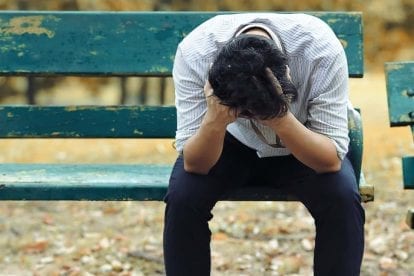What to Do When Your Son or Daughter is Having a Mental Health Crisis

Because we don’t always know what our adult sons and daughters are thinking or feeling, it is important to recognize the signs and symptoms of a mental health episode, crisis, or more prolonged mental illness, and to understand exactly what it is, so that you can get them the help they need. This help will often involve comprehensive therapy, which can address the root causes and get your loved one back to leading the life they have been working so hard to achieve. Your support can make all the difference so don’t be discouraged!
“It wasn’t like this when we were kids”, Kathryn said. “I was worried about boys and homework, but at least I could sleep at night. I could play. I don’t know, maybe that’s why Tom… got sick.”
Tom didn’t just get sick. Kathryn’s son was having an extreme mental health episode or crisis. Often characterized by the inability to deal with what feels like an overwhelming amount of stress or pressure. This is a mental and physical challenge for anyone, but especially for college students and young professionals. And as the parent of a 20-something adult, it can be hard to know what to do when your adult son or daughter is having a crisis, prolonged depression or episodes of acute anxiety.
People suffer from mental health episodes, which can lead to chronic mental illness, for a variety of reasons, sometimes due to stresses and pressures. A parent needs to recognize the signs of a potentially difficult health issue in order to lessen its impact or to avoid it and avoid the dangers of a more prolonged case.
Like Kathryn, you can’t protect your children from everything, especially not now that they’re adults. But you can take the time to understand what they are going through, and work with them to get them the help they need.
What is a Mental Health Episode or Crisis?
When figuring out what to do when your son or daughter is having issues with their mental health, it is important to recognize that there is no one way to define their experiences. What some people refer to as a “nervous breakdown” isn’t strictly a clinical term. It’s a common description of a very particular kind of mental health crisis – but for clinicians and caregivers, it is a very individual experience for each patient, with varying associated diagnoses.
A crisis can be brought on by stress, whether that is from a relationship, from work, from finances, from politics, or just the weird pressure of existence. A person in a state of crisis feels these pressures and stresses acutely, feeling frayed and unable to cope. This leads to the person having challenges existing in their day-to-day life, in handling work, school, or other aspects of life. That can often be exacerbated by the use of substances such as alcohol.
Though it isn’t possible to diagnose a mental health crisis without psychiatric intervention, many signs of a mental health “breakdown” can be seen clearly by friends and loved ones. The fear involved in this kind of situation can feel overwhelming, even paralyzing for the one suffering. Some mental health episodes can include psychotic symptoms and often reflect self-destructive behaviors which need to be addressed immediately.
It is also true that there are often (though not always) underlying mental health issues or co-occurring disorders that may be contributing to a young adult’s stress and challenges. We often see signs of acute anxiety or depression.
What does this mean for your son or daughter? It could mean serious emotional, physical, and social dangers. However, being proactive can save time and pain in the future.
Short- and Long-Term Effects of a Mental Health Crisis
Mental crisis can manifest differently for different people. A mental health episode can last a few hours or as long as a few weeks. The longer an episode lasts, the more havoc it can wreak on your son’s or daughter’s mental and physical wellbeing. Some of the short-and-long-term risks include:
- Malnutrition and weight loss caused by not eating—or unhealthy weight gain caused by “stress eating.”
- Inability to fulfill functions at school or work.
- Illness and general malaise coming from lack of self-care and neglecting hygiene.
- Sleep-related issues, including insomnia or hypersomnia.
- Social withdrawal and isolation.
- Suicidal ideation or self-harm.
Separately, each of these can be a challenge to cope with. When combined, they compound each other and increase feelings of helplessness and overwhelm. That’s why it is important for you to be able to recognize the warning signs of a mental health crisis in your son or daughter so that you can help them find their way back out of that downward spiral.
Begin Your Recovery Journey.
877-727-4343Understanding the Signs of a Mental Health Crisis
How do you recognize a mental health crisis? There are many signs that can give you clues your son or daughter is beginning to move from the normal stresses of a college student’s daily life versus someone having an acute mental health “break”. These signs include:
- Emotional outbursts
- Mood swings
- Difficulty in concentrating
- Severe anxiety
- Falling behind on work
- Missing events (including school)
- Paranoia and hallucinations
- Feeling depressed or not like themselves
So, what can you do if you believe your adult child is indeed suffering from a serious mental health episode? In most cases, comprehensive treatment offers the best way to pave the path to recovery for your son or daughter.
The Benefits of Comprehensive Therapy When Your Son or Daughter is Having a Mental Health Crisis
Watching her son Tom move back and forth from disengagement to wild outbursts and relentless crying jags, Kathryn felt bewildered and frightened for her son. She knew he needed help, but wasn’t sure how to support him. That’s when a friend of hers recommended comprehensive residential therapy.
In a residential program (which included an especially helpful family component), Kathryn and Tom were able to work together to untangle the stresses that had pushed him into crisis. With the help of licensed therapists and the support of his peers, he learned how to identify triggers, develop healthy coping mechanisms, and recognize the warning signs before a crisis fully takes hold. Kathryn, meanwhile, learned more about what her son was going through, and gathered the tools she needed to help him and support him going forward.
Try as we might, most of us can’t read our sons’ and daughters’ minds. We won’t always be able to know what is in their hearts. But we can pay attention to them, learn to recognize the signs of a serious change in their mental health, and work with them in comprehensive therapy to learn how to cope and find a better way forward, together.
Bridges to Recovery offers comprehensive treatment for mental health disorders as well as process addictions and phase of life issues. Contact us to learn more about our renowned programs and how we can help you or your loved one start on the path to healing.






